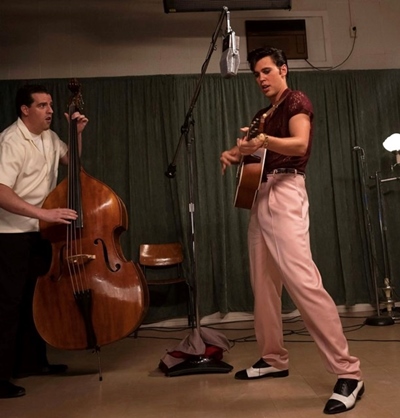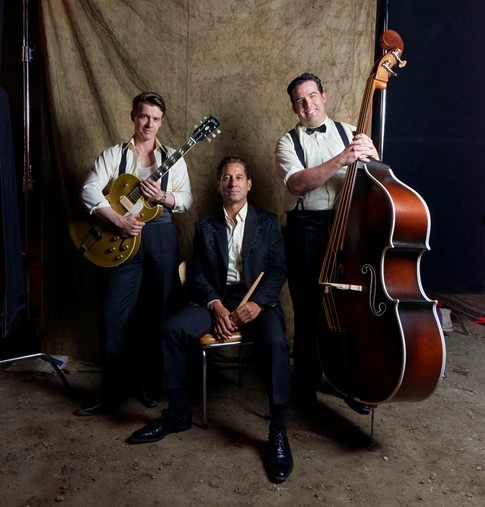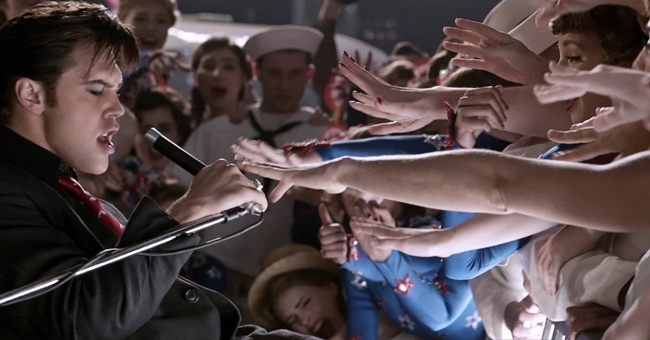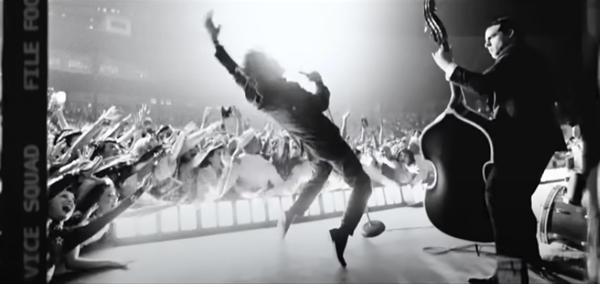 |
 |

The beat behind the King
First, thank you Adam for agreeing to give an interview for the Elvis Information Network. Adam Dunn: An absolute pleasure Paul, thanks for giving me the time to talk all things Bill and The Blue Moon Boys Can you tell us a little bit about yourself? A.D: Sure, I was born in Sydney, Australia. My father is Australian and my mother American. I spent almost all my elementary school years in Michigan where my parents decided to move so we could know her side of the family. I’m a fan of sport, a lover of photography, music and the outdoors. How did you get into the movie business? A.D: I was actually studying to be a history teacher at university when I took my first drama class as a minor subject. It was immediately then that I knew it was what I truly wanted to do. I then trawled through newspapers trying to find acting schools and after graduating from a few I eventually found myself in New York at The Stella Adler Acting School. Are you an Elvis fan and if so, since when? A.D: I never grew up with Elvis but he was always in my peripheral vision. So, whilst I was aware of some of his big hits, I was completely oblivious to his incredible back catalogue. I obviously concentrated on the 50s during filming and it was there I found my favourite version of Elvis. I still remember listening to “Baby Let’s Play House” for the first time and being blown away by it. No drums just Bill thumping the bass. “Mystery Train” was also a record I really loved (interestingly also one of Bill’s favourites). I then ventured into Elvis in the 60s and 70s and found other songs I’d never even heard of. Can you believe I had never heard “If I Can Dream” before? What a privilege it was hearing that for the first time. Hearing those vocals was an ethereal experience. Don’t even get me started with “An American Trilogy”…
How did you manage to get the Bill Black role? You do not have the corpulence of Bill, and he was a little bit older than you, I believe? A.D: Well first of all, bless you and bless you. Unfortunately you’re wrong on this occasion but I appreciate the sentiment! I’m an inch taller than Bill's six foot but I certainly share his heft! In fact I dare say I weigh more than Bill did at his heaviest but I wear it well. Also I’m only a year younger than Bill was when he passed away far too soon at 39. So you can see why I’m flattered! As far is the role is concerned they initially cast quite a wide net when searching for someone to play the doghouse bass player from Memphis. I remember my agent calling me and asking if I could play the double bass and whilst it took all my willpower not to lie, I had to confess that I only knew how to play a little bit of guitar. Fortunately, that was enough to get me an audition where I played and sang “That’s Alright Mama” in a scene that was set at Sun Studios. Despite the audition going well I was informed they were looking for actual bass players. It was at that moment where I took it upon myself to get a lesson and hire a bass on the off chance I got a call back. The day I hired the bass I got a call informing me that not only did I have a callback but Baz himself would be in the room. That night I put band aids on my fingers in preparation for blisters and practiced all night before performing for Baz. I won the role. Were you a fan of Elvis' seminal Sun sessions? Were you aware of the importance of them in the history of Rock'n'Roll? A.D: Very early on I was on the hunt for audio clips of Bills speaking voice. It was really important to me to get his specific accent down. From what I could find there is a great clip of him on Bob Neals radio show talking about selling pictures of Elvis “before the show, during intermission, after the show. Matter of fact I’ll be selling them all night long”. There’s a short clip of him speaking in a role on Elvis’ film Loving You but one of the most interesting and brief clips you can find is in the outtakes on Sunrise, the Sun Records release of the very first few sessions of The Blue Moon Boys. It’s amazing hearing these guys not only play but navigate this new style that would eventually explode all over the world. Elvis may not have invented it but he was the one to take Rock and Roll into the stratosphere. How did you interact with Tom Hanks, who won two Oscars, and Austin Butler who was a virtually unknown actor? A.D: I remember the first time I met Tom Hanks was at a covid briefing at the hotel. It was just supposed to be myself and a few of the crew so I was essentially wearing my pajamas! Then one of the greatest actors of all time and a hero of mine walks into the room and I am SEVERELY under dressed. During the briefing Tom leans over to me and whispers jokingly “You’re going to be the first one to get it” to which I replied “If I get it you’re the first person I’m giving it to”. Needless to say that a month later Tom Hanks is one of the first people to contract covid in Australia and the film gets shut down for 6 months! He was an absolute joy to work with. A kind generous man who has time for everyone and is a master craftsman of his trade. The very first time I met Austin he pulled me in with a very warm embrace and told me how excited he was to meet me. He was already dressing like Elvis, sounding like him and by god even the very first time I played behind him I could have sworn it was Elvis. Much like Elvis, Austin also shares his shyness and Elvis’ playfulness. Austin also found his confidence through performance and those performances were electric. I had a front row seat looking into the eyes of those extras clamoring for him to just glance their way. There was no acting required from them. Bill used to take Elvis for a walk after lots of those early shows because Elvis still had that kinetic energy inside his body and they needed a way to let it out. Often after one of those performance days I would walk with Austin and debrief about the day. How he managed to maintain that level of intensity over the two years blows my mind. He deserves every accolade coming his way.
I assume you rehearsed a lot with Austin and the actors who played Scotty Moore, and later with DJ Fontana? What was a typical session like? A.D: We did! Xavier Samuel and Terepai Richmond who played Scotty and DJ respectively are now my dear lifelong friends. Xavier is an incredible actor and really had to knuckle down to learn how to play the almost inimitable Scotty Moore. Terepai is a professional drummer that tours regularly but as it turns out is a very fine actor! In the very early days before Terepai was cast, the three of us really began coming to terms with becoming a band. Xavier had a key to my hotel room and would come up every night to practice. We would rehearse in studio 1 which was affectionately known as “the Dojo”. These rehearsals would always include the music department who were all incredible musicians themselves and often Pollyanna Bennett who was the movement coach on the production and helped all three of us find our characters physicality, especially Austin’s. Then of course there was Baz, guiding the narrative of all these performances and always being a collaborative generous director. We also rehearsed a lot on set during breaks. Austin might start strumming the guitar or maybe Xavier and then one by one we’d join in. I’d start slapping and Terepai would start hitting anything in reach. There are hours of video out there somewhere of us fooling around playing songs together.
Without revealing too many secrets, how many songs were filmed that did not make it to the movie we saw? Any titles? A.D: There weren’t many that were filmed that didn’t make it but we certainly learned many that didn’t end up getting used. We had versions of “I love you because” “Harbor Lights” and “That’s When Your Heartaches Begin” - which to hear Austin sing live was caramel for your ears. We also had a fantastic version of “Blue Suede Shoes” that we didn’t shoot and I was disappointed because I wanted to sit on the bass and ride it like Bill on the Milton Berle Show when they were on the USS Hancock! Were some in the vein of the “Trouble” sequence which was absolutely fantastic? A.D: We did shoot a version of “Good Rocking Tonight” at The Hayride that was an absolute blast but unfortunately didn’t have time for it in the final cut.
You must have some interesting anecdotes about incidents that happened during the filming. Would you care to share some? A.D: The riot that occurs at the end of the “Trouble” sequence at Russwood Park was an unbelievable melee. People would be running in all different directions while we had “policeman” throwing us into cars and Elvis was being dragged away in the opposite direction. It was chaos. We shot that sequence over 4 days always shooting the whole piece from beginning to end every time. Each time I would see something new I hadn’t seen before. One of these takes this young lady tripped and fell off the bandstand almost breaking her neck. I shrugged off the young man assigned to dragging me away because this woman needed medical attention. As I got to her, worried about moving her after such a fall, I asked in a very concerned manner if she was ok? Yes she replied, I’m a stuntwoman. She had been doing that every single take. Because of Covid, the filming lasted a lot longer than it should have. How did you deal with all those delays? A.D: I was worried because I thought the whole thing may be cancelled. It is an absolute credit to the producers, the state of Queensland, Baz, Tom and Austin that it got made at all. It was a herculean task from the production with everyone on set wearing masks and everyone getting PCR tested twice a week. For me personally despite the 6 month layoff, I was happy to get a little more time under my belt to learn the bass.
Was the filming in chronological order? In other words, once the 50’s were covered, were you released from the set? A.D: The first thing that was actually shot was the 68 special. For Austin to come in and the first thing he shoots is one of the most pivotal moments in Elvis’ life must have been incredibly daunting. We did shoot much of the 50s stuff together as a chunk but there were always little bits to pick up so I was there for the majority of the shoot. If I remember correctly a rough timeline of the shoot looked like 68 special, the International, 50s, Beale St and Vegas apartments.
I just wish more emphasis had been given to the Blue Moon Boys. Bill Black saved some of Elvis’ early appearances from turning into disasters. Is there something about some instances in the movie that was not shown in the final cut? A.D: I know! You and me both! We shot much much more but unfortunately when you are doing a film that is covering the scope of Elvis’ life there are going to be some casualties in the timeline. You would know Paul, having written a book on Bill yourself that an entire film could be made on their exploits alone. The famous story of Elvis’ first night recording “Thats All Right Mama” at Sun that so many other Elvis productions have done. Rehearsing above Scotty’s brothers hat shop. The early days touring the south with Bills bass strapped to the top of the car and ultimately the Colonels disintegration of the bands relationship by depriving them of the money that they deserved. I am however grateful that certain aspects did make the cut. Bills encouragement of Elvis’ wiggle is a good example of Bills savvy when it came to saving those early shows. In my opinion, the Blue Moon Boys certainly had more impact on Elvis’ success than Tom Parker. How do you feel about it? A.D: I couldn’t agree more. I spoke to Ken Burke one of the authors of “The Blue Moon Boys” before production started and I remember him saying “without the help of Scotty and Bill, Elvis never makes it out of Memphis”. Whilst that might be hyperbole the influence of Scotty and Bill can’t be overstated. In fact if it wasn’t for Scotty’s insistence to Sam Phillips to get him in for a trial we may never of heard anything from him. Despite Bill telling Scotty “he didn’t impress me too damn much” Bill was a huge catalyst behind encouraging Elvis to find his performance. Not only did he egg him on when he started singing “Thats Alright Mama” at Sun but he also was the impetus behind “Blue Moon of Kentucky” the b side which together with “Mama” launched Elvis onto the country and R&B charts. They then fostered a young Elvis into stardom and when he got there, the Colonel took over and then left the boys in the dust without a penny to their name. So yes, Elvis would have been Elvis without the Colonel but maybe not without Scotty and Bill. You told me that you learned to play the bass for this part. How did it go? A.D: Playing the role of Bill with the respect that he thoroughly deserved also included playing the instrument that he really made his own. Fortunately I had a good understanding of the left and right hand relationship from playing guitar. Where it got tricky was firstly playing it upright. Then there was the issue of not having any frets which mean you’re virtually guessing where the notes are and lastly learning that double-slap Bill was famous for. I had an incredible teacher in Mark Harris who not only taught me how to play the instrument but also taught me how to play it like Bill would. Bill didn’t have the best technique because he taught himself so Mark actually taught me the wrong way so I could play like him. I’ve continued playing the double bass and to this day still play the same way Bill does. If anyone is interested in my progression during that period there is a video on my Instagram chronicling the journey.
How would you characterize Baz’s directing style? A.D: I’ve heard Baz’s directing style referred to as style over substance for many many years. I think largely due to the fact that his style is so exquisitely meticulous but it would be a massive disservice to the man to discount his substance. Baz is a lover of narrative and is constantly collaborating with his actors and crew to make the best film possible. For years before he even started writing the film he was exploring the life and times of Elvis and building a deep knowledge of not just the man himself but what he represented. I remember him showing me a 13 minute “sizzle reel” before filming began of a collection of clips he’d put together to show his vision of the movie. It was always a film about telling the story of America over three decades through the prism of the most iconic person in the world. That 13 minutes was one of the most inspiring things I’d ever seen. In terms of being a musician, before making the movie what music did you play as a guitar player? And has the movie changed your actual interest in rock'n'roll or perhaps investigating more of pop music's complicated heritage? A.D: I have always been a fan of singer songwriters and what I find myself playing tends to be a folkier style. Simon and Garfunkel, Nick Drake, CSN, Fleetwood Mac, etc with newer music like Elliott Smith and Bon Iver also featuring heavily. The film has definitely opened my eyes to a wider spectrum and given me a much deeper appreciation not only for the early beginnings of Rock and Roll but also country and gospel. I have a playlist on my phone where if I read anywhere about Bill’s musical influences I added it to the list. Bands like The Maddox Brothers and Rose, Red Foley, Hank Williams, The Ink Spots, Fats Domino, Howlin’ Wolf, Chuck Berry, Roscoe Gordon and Bill Haley to name a few. There’s a great story early on in Bill’s life where he used to sneak over to his neighbours house with his brothers to sit under the window to listen to The Grand Ole Opry. It felt the same for me discovering this new music. Has your role in the movie raised your profile as an artist and impacted some of your future projects? A.D: Well I suppose it’s not everyday that someone like yourself Paul is asking me to comment on my time working on a multi-million dollar blockbuster so that’s new. Time will tell when it comes to more projects from here. All I know is that with any role in the future I’ll be throwing myself at it with the same tenacity and gusto as I did with Bill Black. Thank you, Adam, for your time. This has been a very interesting interview that I’m sure will be well received. Your sense of humor and way of storytelling are similar to Bill’s. He would have been proud of the way you portrayed him. If some fans have more questions, would you be willing to reply to them? A.D: It’s my absolute joy Paul, and thank you for having me. That’s very kind of you to say. It was one of the greatest honours of my life to portray Bill and I have nothing but the utmost respect for him and the Black family. Happy to answer anything. This has been really fun to revisit some of these memories from a long time ago! I was cast in 2019!
Interview by Paul Bélard. Fans of Paul’s books will be pleased to know that his latest release, Elvis The King of the Rings Volume 2, is currently with the printer. Paul can be contacted at pbelard@hotmail.com Interview by Paul Belard / layout Piers Beagley. Click here to comment on this interview - And send YOUR Interview questions
EIN Website content © Copyright the Elvis Information Network.
Elvis Presley, Elvis and Graceland are trademarks of Elvis Presley Enterprises. The Elvis Information Network has been running since 1986 and is an EPE officially recognised Elvis fan club.
\
|
|



















